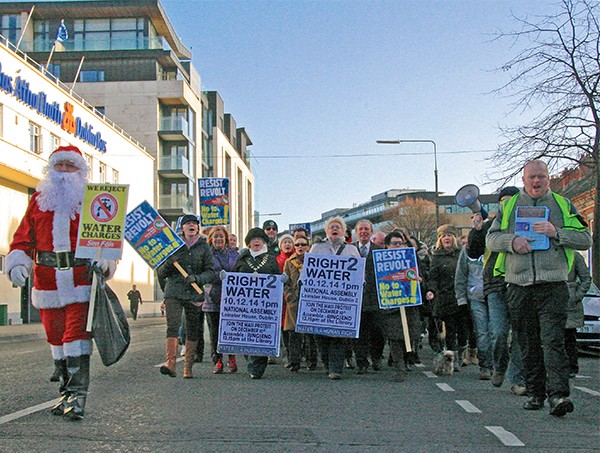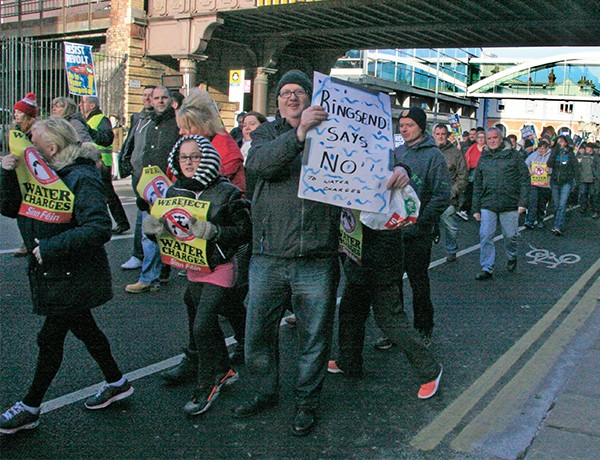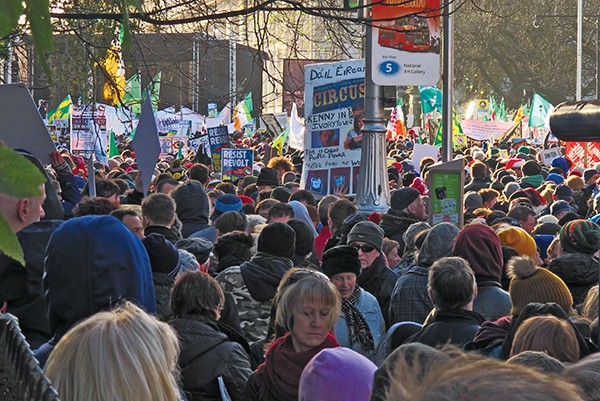
Photos by Maria Shields O’Kelly and Eugene Carolan.
It will be no news to anyone who was out on the day that Wednesday December 9th 2014 was a landmark moment in Dublin’s capital amid the tensions which had been building between the population and their elected representatives.
In previous issues, NewsFour has addressed the Water Charges controversy obliquely, mainly by focussing on the pros and cons of installing rain harvesting equipment.
By December 2014, the story had only grown and grown, to the point where your friendly neighbourhood good-news newspaper simply had to dispatch someone to cover the story, and if your faith in democracy has been flagging over the last few years, then we did find a good news angle after all: the people power was on display that Wednesday afternoon, no matter how the conflict eventually plays out.
The Ringsend/Irishtown and environs marchers set out from the plaza surrounding Ringsend Library at 12.20pm. The core group of around 40 gathered very quickly and set off without hesitation, onto Ringsend Road and over the bridge onto Pearse St, led by representatives of People Before Profit from the South Inner City.
The Right2Water alliance is a campaign based on the co-operation of trade unions such as Mandate and Unite the Union, a number of political parties and independent TDs such as Sinn Féin Ireland, People Before Profit, Seamus Healy TD and Clare Daly TD and a variety of community action groups across the country.
On paper, that list may seem alienating to those who don’t identify with the political left but the enormous popular turnout on the day indicates that there is a broad popular appeal to the campaign that crosses traditional political boundaries.
Arriving at Merrion Square via Westland Row, the Ringsend/Irishtown contingent melded into the large crowd that was already assembled. The time was 1pm or so. The south west corner of the square, adjacent to Leinster House, was the site of a stage and approaching it was no easy task, given the density of the crowd.
Most people present that NewsFour approached were reluctant to be interviewed and those we did speak to declined to go on record. There was a certain suspicion of the press, which may well be justified given the extremely downplayed coverage of the assembly by the mainstream press in the days that followed. There are still extremely varied estimates on how many were in attendance on the day. Right2Water asserted an attendance of 100,000 people while the Gardaí estimate was as low as ‘30,000 plus’ according to RTE.

There can be no doubt that a vast number of attendees travelled into Dublin from counties across the nation. The issue of numbers is contentious in one sense, and a non-event in another: by 3pm at the latest on the afternoon, Merrion Square and the immediate surrounding areas were closed to new arrivals, following calls from the stage that crowding near the front was becoming potentially dangerous. These two facts indicate that there was no shortage of bodies to hand.
The Garda presence on the day was visible but understated – despite much anticipation in the national press in the days leading up to the Assembly, concerning Garda personnel being bussed into Dublin from around the country. There were also rumours on the day, later confirmed online, that Garda equipped for riot control were stationed on Kildare St, near the front entrance to Leinster House. Designated civilian personnel were on hand in hi-vis jackets to assist in crowd control without giving the negative impression of being heavy-handed or authoritarian.
Maybe it was the cold or the shared focus of the matter at hand, but there was no indication of trouble or the potential for trouble. Musicians and poets were on hand over the course of the afternoon to provide entertainment, and of course there was an array of speakers from across a range of cultural and political concerns who addressed the crowds. Speakers included representatives of successful campaigners from Crumlin Says No and Ballybay Against the Water Tax.

The main thrust of the objection to the Water Charges was couched in terms of the pressure five years of austerity-driven cuts placed on the citizenry. One chant that rang out on the day was “Burn the bonds, not the Billions”. Dublin historian Lorcan Collins framed the events in the context of James Connolly’s ideas of social responsibility, including public ownership of the basic necessities of life. He also spoke very frankly of his experience of apparently being placed under surveillance by Irish Water.
TDs Clare Daly, Richard Boyd Barrett and Sinn Feín leader Gerry Adams all spoke and were well received. The climax of the day was a rousing and supportive speech by visiting members of the Detroit Water Brigade, veterans of a similar and direr utilities emergency in the famed Motor City.
Of all the speakers, Paul Murphy MEP was the one who most openly spoke in terms of strategy and tactics, pointing to the need to keep up the pressure (pun intended?) in the early months of 2015. How the dispute over Water Charges will continue to develop remains to be seen.
By Rúairí Conneely

